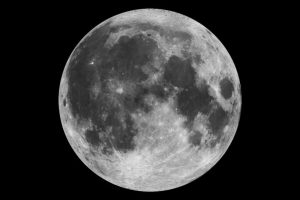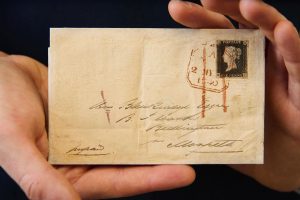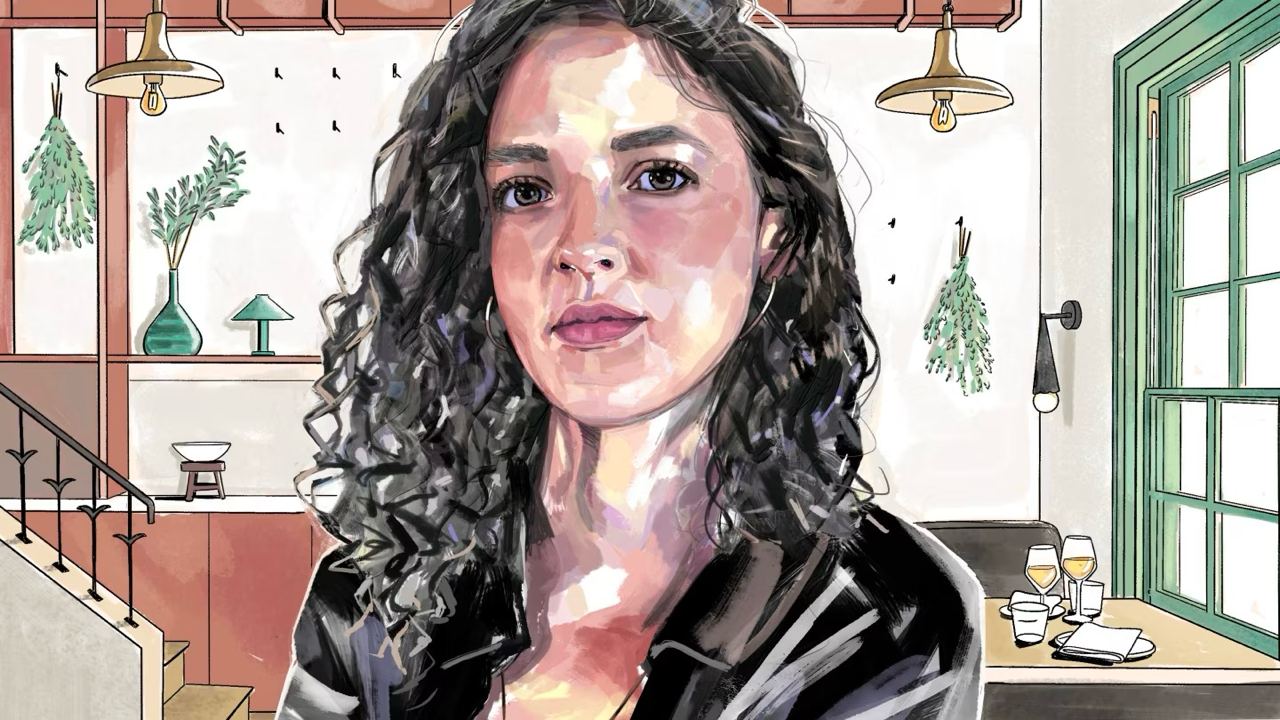As I sit in the corner of Akub, a Palestinian restaurant just off London’s Notting Hill Gate, waiting for Isabella Hammad to arrive, an idling waitress draws my attention to the olive tree nestled in the space behind me, its branches arching into a canopy over my table. “Do you think it’s real or fake?” she asks. I squint at the tree. “Real?” I venture, unable to make up my mind.
“Nope,” she replies cheerfully. “It’s fake.” We are still on the topic when Hammad, dressed all in black, walks in, and I pose her the same question. She trains a novelist’s eye on the tree and spots a faint, straight line around its trunk that had eluded me. “Is it half real, half fake?” she asks. “Has a real tree been grafted on to a fake one?”
“No one’s ever said that before,” says the waitress.
She is not the first to be struck by Hammad’s imagination and eye for detail. Hammad’s debut novel, The Parisian, published when the British-Palestinian author was just 27, won a string of awards and praise from literary luminaries such as Zadie Smith for its vivid evocation of Palestine and France in the early years of the last century. After her second book, Enter Ghost, hit the presses last year, Granta magazine named the 32-year-old in its once-a-decade list of Britain’s best young novelists.
Today, though, it is not just literature that is on her mind. We are meeting on the 83rd day of the war between Israel and Hamas and, like everyone I know with connections to the region, Hammad is reeling. The past three months have witnessed the bloodiest round of fighting in the Israeli-Palestinian conflict since the war that accompanied Israel’s founding in 1948.
The hostilities erupted on October 7 after Hamas militants rampaged through villages and kibbutzim in southern Israel, killing 1,200 people, and taking another 240 hostage. In the weeks and months since, Israel’s ferocious response has killed more than 24,000 Palestinians, and reduced much of Gaza to rubble.
But figures alone barely scratch the surface — either of the trauma that Hamas’s attack has triggered in Israel, or of the scale of the destruction that Israel has unleashed in Gaza. Across the region, and in the Palestinian and Israeli diasporas, people are grappling with the enormity of what is unfolding, as well as its implications for the fraying dream of coexistence and the stability of the Middle East.
“It’s horrifying in a way that makes me reflect on certain kinds of optimisms I might have had that have collapsed,” says Hammad, when I ask if she sees this as a turning point. “It’s hard to know where we’re going, but it doesn’t look good . . . My mother said this morning: ‘We need a deus ex machina’ . . . I think certainly [there is] the feeling that everything has changed.”
Hammad has picked Akub — the first foray into London by Fadi Kattan, one of the best-known Palestinian chefs — as she has not been there before. The restaurant, bathed in the wintry light seeping in via its glass roof, is half empty. Staff, however, are in abundance. Hammad orders a sparkling water, before adding a lemonade at the encouragement of our waitress. I also opt for a lemonade, and turn the conversation to Hammad’s journey into literature.
Born and raised in west London by a Palestinian father and a British-Irish mother, Hammad says she read and wrote a lot as a child. She knew “from quite a young age, sort of seriously-ish” that she wanted to write a novel inspired by tales of her great-grandfather, Midhat, a bon vivant whose adventures and love affairs have become part of her family lore.
As a teenager, as well as starting then abandoning “a few” other novels, she began interviewing her grandmother Ghada about Midhat. But it was only after her studies at Oxford university that she started “seriously having a go” at the novel, visiting her father’s homeland for the first time for a year of research, as well as completing a masters in fiction at New York University, where she was taught by Smith.
Being an heir of multiple traditions, I think it’s a fertile ground to make things and look at things freshly
The result was The Parisian. Novels written in English by Palestinian authors often take the 1948 war — when 700,000 Palestinians fled or were forced to flee their homes in what they call the Nakba, or catastrophe — as their point of reference. But Hammad wanted to write about the Palestine that existed before that event, and her novel follows a fictionalised Midhat from his native Nablus (now in the occupied West Bank) to Montpellier and Paris and back in the two decades before the 1936 Arab Revolt.
By contrast, Enter Ghost, which charts the struggles of a troupe of Palestinian actors as they try to stage an Arabic production of Shakespeare’s Hamlet in the West Bank, is set more or less in the present. Its protagonist is Sonia Nasir, a spiky actress, who lives in London but visits her sister in Haifa to seek refuge from a failed love affair, before being drawn into the play.
One theme that seems to have struck a chord among Palestinian readers is Hammad’s dissection of the complicated relationship between the two sisters, who represent two different sides of their experience: those who stayed, and those who left.
The theme of the tensions between the parts of one’s identity linked to different places is also a thread that runs through The Parisian — in some ways, Midhat is out of kilter with his surroundings in both France and Nablus — and I ask Hammad if it is something she has also felt herself, and whether being the inheritor of different artistic traditions is something she finds productive.
“I’m interested in that condition, but I feel I know where my loyalties lie and where my politics are, and I don’t have an identity crisis at all,” she replies. “Artists are often between things, where they’re trying to look at things in fresh ways, and being an heir of multiple traditions, I think it’s a fertile ground to make things and look at things freshly. Maybe it gives you some kind of freedom.”
Our waitress reappears. I defer to Hammad’s local knowledge, and she selects a variety of dishes to share: za’atar bread to start, followed by others, including shish barak — squash dumplings served with beetroot tahinia — and mafghoussa, a concoction of courgettes and garlic yoghurt, pine nuts and mint. The one that most catches my eye, though, is the bukjet mousakhan, a dish of chicken, sumac and onion, which, in Kattan’s iteration, is served inside a roll of bread.
By now, our conversation has turned to Gaza. Hamas’s attack on October 7 was the darkest day in Israel’s history. President Isaac Herzog described it as the deadliest for Jews since the Holocaust, and the brutality of Hamas’s killings, combined with the failure of a country built to be a haven for Jews fleeing persecution elsewhere to provide security for its citizens, has left a deep scar in the national psyche.
But Israel’s relentless bombardment has left almost no family in Gaza untouched. It has displaced about 1.9mn of the coastal enclave’s 2.3mn inhabitants, while huge swaths of the territory have been rendered uninhabitable. The fabric of life in the enclave, from hospitals to archaeological sites to bakeries, has been obliterated.
According to Palestinian health officials, the 24,000 killed by Israel’s offensive include more than 7,000 women and more than 10,000 children, and in recent weeks, international outcry at the destruction has been mounting. US President Joe Biden, long Israel’s staunchest ally, has criticised its “indiscriminate bombing” of Gaza, while South Africa has brought a case at the International Court of Justice accusing Israel of genocide — a claim Israel furiously rejects.
During the hearing in The Hague last week, Israeli officials insisted Israel was acting in self-defence, had complied with international law, and had targeted only Hamas — despite the fact that Hamas had embedded itself in civilian areas.
Hammad says that Hamas’s attack on October 7 was “horrific”. But she also bridles at the way that Palestinians in the public sphere are often asked to condemn the militant group before discussing the situation in Gaza.
“I think when Palestinians are asked to condemn Hamas as a barrier to entry into the conversation in the first place, then they maintain a silence about it, because their own empathy gets used against them,” she says. “But of course, it was horrific. I mean, obviously.”
But she rejects the idea that Israel’s response is proportionate or targeted at Hamas, pointing to the destruction of universities, cultural institutions, schools and hospitals, and the numbers of children killed. As I dwell on the topic, she looks increasingly downcast, and her voice begins to drop.
“It’s very difficult to support the idea that this is a war against a militant group. It’s a war on Palestinians and it’s genocide,” she says, citing an article by the Israeli Holocaust scholar Raz Segal, who called Israel’s actions in Gaza a “textbook case of genocide”.
More broadly, she argues that the destruction underscores the failure to build an international order based on rules and rights, rather than brute force.
“After the second world war there were all these institutions that were built, the United Nations, the concept of international human rights law . . . and now what?” she continues. “I think they’ve already failed, there’s just no pretending anymore.”
All these institutions that were built, the United Nations, the concept of international human rights law . . . I think they’ve already failed
Akub has filled up a little. The chatter from neighbouring tables has begun to merge with the eclectic mix of Arab and western music emanating from a speaker behind Hammad. We — or possibly I — have made short work of the za’atar bread, and our attention has turned to the mousakhan.
Hammad says that she wants to take “succour” from the street protests demanding a ceasefire that have taken place from London to Istanbul. But she has little hope they will succeed.
“You could say about all political protests in some ways that the act of protesting is important for your own humanity. And that’s the best way to think about it rather than, ‘I will achieve this end’. Because then you will always feel like you failed,” she says. “But you don’t know where your actions might lead, it might be that the next generation takes it on, and your actions are very important for them. It becomes a faith question.”
As the war in Gaza enters its fourth month, the fallout has also reached the worlds of culture and academia. In the US, it has fed into a furious battle over antisemitism on university campuses, which has played a part in the heads of Harvard and the University of Pennsylvania losing their jobs.
It has also reverberated through the arts world, with exhibitions, awards ceremonies and talks cancelled — and often those affected have been associated with the Palestinian cause. In October, an award ceremony at the Frankfurt book fair honouring the Palestinian writer Adania Shibli was postponed indefinitely. The following month, Christie’s auction house removed two paintings by the Lebanese artist Ayman Baalbaki from a sale, including one featuring a man in a red-and-white keffiyeh, seen by many as a symbol of Palestinian identity.
Hammad says she has not personally been affected by the furore. But overall, she feels the Palestinian perspective is being squeezed out of the conversation.
“When we talk about mainstream publications in America and the UK, the general line being pushed is the Israeli state line with little dissent. That’s very disturbing,” she says. “I think some of the pushback is sometimes invisible and sometimes it’s not invisible. Now people do want to hear from you, but they only want to hear certain things.”
We have finished off the bulk of the food and ordered coffees — a cappuccino for me, a double espresso with milk on the side for Hammad — and I ask her whether art can process human suffering of this magnitude. Could she ever imagine writing something about Gaza herself?
“I think when you’re in crisis and a catastrophe is unfolding before your eyes, it’s very difficult to feel like you have a function as an artist,” she replies.
The idea that a novel can influence history, she continues, is “wishful thinking”. “It’s a slow art form. When you read a novel, you’re alone, usually. It’s a solitary thing, it’s thinking deeply. These things don’t lend themselves to quick action, but they work on your inside. I do believe books can change people, but it’s a very slow process.”
I feel really guilty, because you’re fine. I think no discomfort I have is anything on the people who are there
For now though, it is not something Hammad can envisage attempting. “I don’t feel that I would be ready to try and inhabit it imaginatively. I somehow feel . . . I feel like you just actually need to observe the real [situation], you need to listen to people who are there,” she says, sounding at a loss. “I feel guilty. I feel really guilty, because you’re fine. I think no discomfort I have is anything on the people who are there.”
Her next book will centre on the 1955 Bandung conference, when African and Asian nations gathered to discuss decolonisation — a topic, she says, that will allow her to deal with the question of Palestine in a global context. She would also like to write a follow-up to The Parisian, possibly involving her grandmother, who has a cameo in the first novel.
“She’s desperate to have a novel written about her,” she says, brightening. “She was asking: ‘Who are you writing about now?’ I said: ‘I don’t know — who do you think I should write about?’ And she was, like: ‘Me’.”
My coffee is almost gone. But our waitress emerges with a plate of baklava that she insists will be on the house, and an offer of further doses of caffeine. We decline the coffee, and try the baklava, but neither of us makes serious inroads.
In a lecture she delivered in the US at the end of September, shortly before the war erupted, Hammad cited “pessoptimism” — a word coined by the Palestinian author Emile Habibi — as perhaps the only mindset with which Palestinians can confront their long subjugation to Israeli power.
As our lunch winds down, I ask her whether, despite the destruction of the last three months, the renewed focus of the international community on the Israeli-Palestinian conflict could yet help kick-start diplomatic efforts to find a peaceful solution, which have been moribund for the last decade.
“At what cost though?” she replies. “I hope that something has shifted in a horrible stalemate that was just eroding Palestinian life and future, and that out of this destruction something might be reborn. But who knows.”













